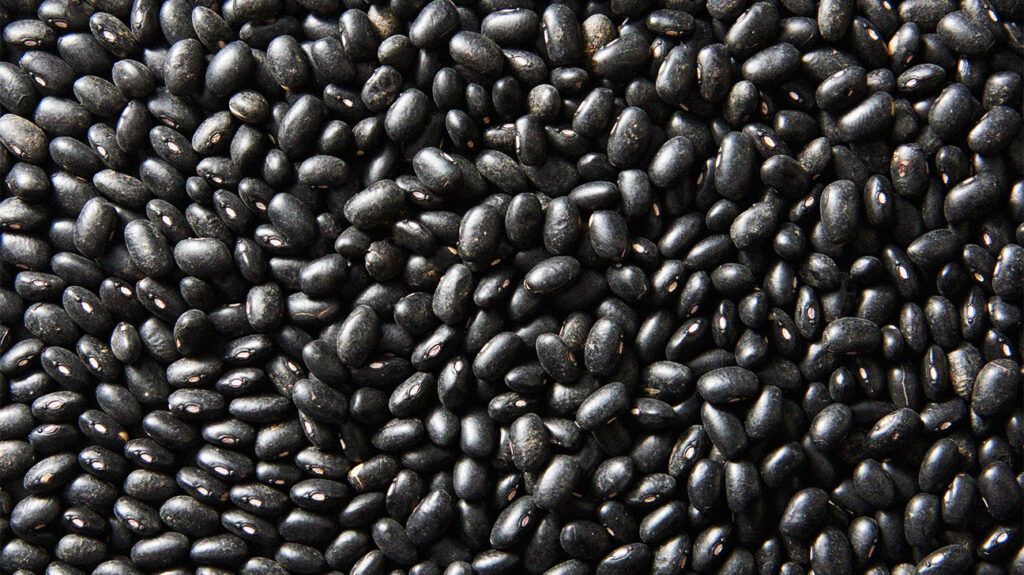Like other legumes, such as peanuts, peas, and lentils, black beans are prized for their high protein and fiber content. Black beans also contain several other key nutrients that benefit human health.
Black beans are legumes, which are the edible seeds of a plant. Because of their hard, shell-like appearance, they are also known as turtle beans.
This article provides a nutritional profile of black beans, their possible health benefits, how to incorporate black beans into your diet, and any potential health risks of consuming them.
Fast facts on black beans
- Among other benefits, black beans may help strengthen bones.
- Black beans contain quercetin and saponins which can protect the heart.
- Black beans contain around 114 kilocalories per half-cup.

The potential health benefits of black beans include:
Maintaining healthy bones
The iron, phosphorus, calcium, magnesium, manganese, copper, and zinc in black beans all contribute to building and maintaining bone structure and strength.
Calcium and phosphorus are important in bone structure, while iron and zinc play crucial roles in maintaining the strength and elasticity of bones and joints.
Roughly 99% of the body’s calcium supply, 60% of its magnesium, and 85% of its phosphorus stores are contained in bone. This means it is extremely important to get enough of these nutrients from the diet.
Read about how to increase bone density naturally.
Lowering blood pressure
Maintaining a low sodium intake is essential for keeping blood pressure at a normal level. Black beans are naturally low in sodium and contain potassium, calcium, and magnesium, all of which can help people manage their blood pressure.
Be sure to purchase low sodium canned options and still drain and rinse to further reduce sodium content.
Managing diabetes
Studies have shown that individuals with type 1 diabetes who consume high fiber diets have lower blood glucose levels. Additionally, people with type 2 diabetes may have improved blood sugar, lipids, and insulin levels. One cup, or 172 grams (g), of cooked black beans contributes
The United States Food and Drug Administration (FDA) recommends 28 g of fiber per day based on a 2,000-calorie diet. This may vary depending on a person’s calorie intake.
Preventing heart disease
The fiber, potassium, folate, vitamin B6, and phytonutrient content of black beans, coupled with its lack of cholesterol, all support heart health. This fiber helps lower the total amount of cholesterol in the blood and decrease the risk of heart disease.
Vitamin B6 and folate prevent the buildup of a compound known as homocysteine. When excessive amounts of homocysteine accumulate in the body, it can damage blood vessels and lead to heart problems.
The quercetin and saponins found in black beans also help protect the heart. Quercetin is a natural anti-inflammatory that appears to
Research also indicates that saponins help
Preventing cancer
Fiber intakes from fruits and vegetables like black beans are associated with a lower risk of colorectal cancer.
Black beans are high in folate, which plays a role in DNA synthesis and repair and may
Saponins in black beans prevent cancer cells from multiplying and spreading throughout the body. However, selenium, which is also in black beans, may help cancer cells to proliferate. Researchers are looking for ways to starve cancer cells of selenium to kill them.
Healthy digestion
Because of their fiber content, black beans help to prevent constipation and promote a healthy digestive tract. They also provide fuel for the healthy bacteria in the colon.
Read more about dietary fiber.
Weight loss
The dietary fiber in black beans and other plant foods is an important factor in weight loss and weight management. High fiber foods can increase the sense of fullness after eating and reduce appetite, making an individual feel fuller for longer, and thereby lowering overall calorie intake.
Read about the best foods for weight loss.
According to the
- Energy: 227 kilocalories
- Protein: 15.2 g
- Fat: 0.9 g
- Carbohydrate: 40.8 g
- Fiber: 15 g
- Sugars: 0.55 g
- Calcium: 46.4 milligrams (mg)
- Iron: 3.61 mg
- Magnesium: 120 mg
- Phosphorus: 241 mg
- Potassium: 611 mg
- Sodium: 1.72 mg
- Zinc: 1.93 mg
- Thiamin: 0.42 mg
- Niacin: 0.87 mg
- Folate: 256 micrograms (mcg)
- Vitamin K: 5.68 mcg
Black beans also contain a variety of phytonutrients, such as saponins, anthocyanins, kaempferol, and quercetin, all of which possess antioxidant properties.
As with many beans and legumes, black beans contain starch, a form of complex carbohydrate. Starch acts as a “slow burn” energy store that is slowly digested by the body, preventing a spike in blood sugar levels.
Black beans are available year-round and are available in grocery stores either dried and packaged or canned. Their dense, almost meaty texture makes them a popular source of protein in vegetarian dishes.
A person should select canned black beans with no added sodium and drain and rinse them before use.
When preparing dried black beans, it is important to sort them, picking out any small rocks or other debris that may have ended up in the package. Wash and soak them in water for at least 8 to 10 hours before cooking to achieve optimum flavor and texture. They are ready when they are easy to split apart by squeezing.
Soaking dried legumes reduces the amount of time needed to cook them and also helps remove some of the oligosaccharides that cause gastrointestinal distress. Soaking beans for longer periods can help to reduce phytates, which may reduce mineral absorption.
Tips for using black beans
- Make a hearty black bean soup by blending cooked black beans with onions, tomatoes, and spices.
- Add black beans to burritos.
- Blend cooked black beans with garlic, onion, fresh cilantro, and lime juice for a quick and easy bean dip.
- Mix black beans, onions, lettuce, tomatoes, avocado, sharp cheddar cheese, and salsa together for a simple taco salad.
Legumes contain oligosaccharides known as galactans—complex sugars that the body cannot digest because it lacks the necessary enzyme, alpha-galactosidase.
Because of this, eating legumes, including black beans, may cause intestinal gas and discomfort in some people.
To prevent this, people can:
- incorporate them into the diet gradually
- soak beans for longer
- opt for sprouted beans
- drain the water used to soak dried legumes and rinse them before use
Black beans are an affordable and versatile ingredient that people can use to increase the nutritional value of their meals.
Black beans contain many nutrients that help nourish the body and contribute to lowering a person’ risk of various health conditions.
However, a person’s overall eating pattern is the most important in preventing disease and attaining good health. It is better to eat a varied diet than to concentrate on individual foods as the key to good health.


